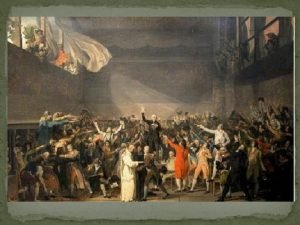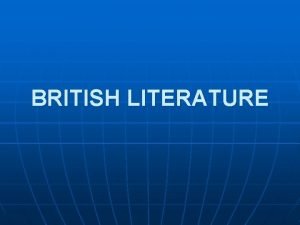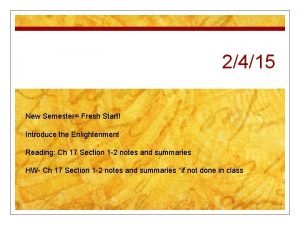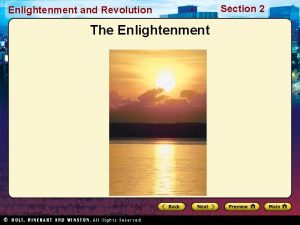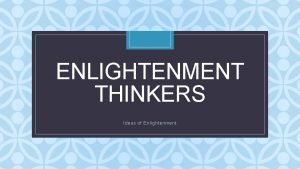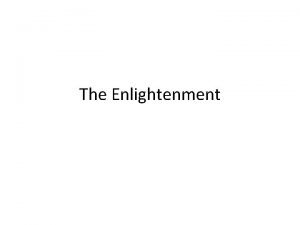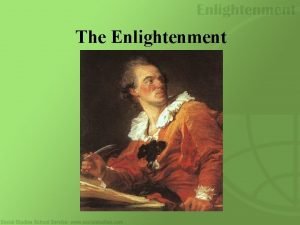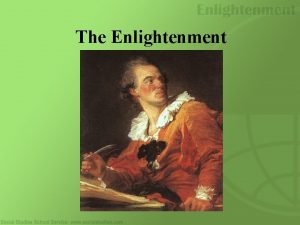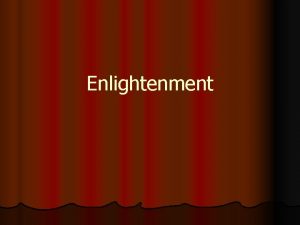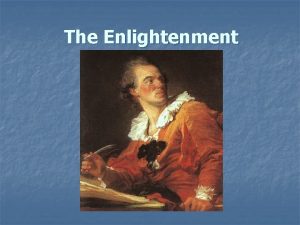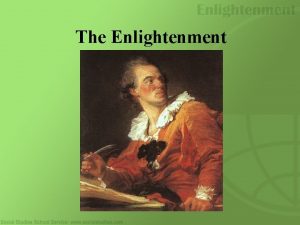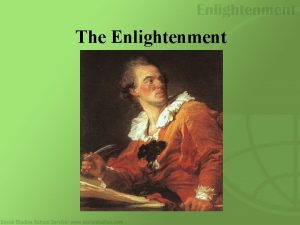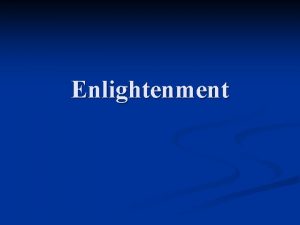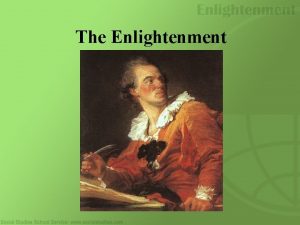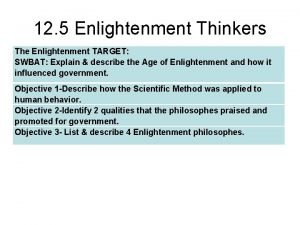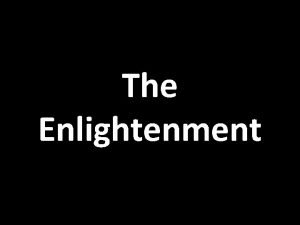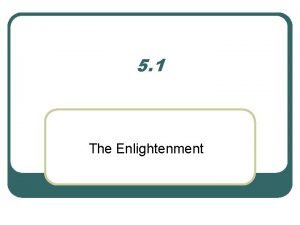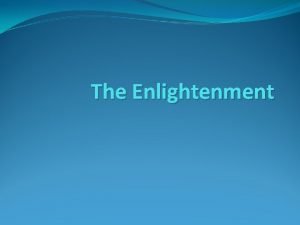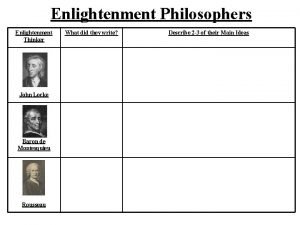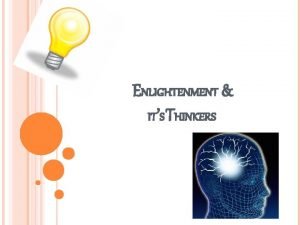The Enlightenment What was the Enlightenment The Enlightenment















































- Slides: 47

The Enlightenment

What was the Enlightenment? �The Enlightenment was an intellectual movement in Europe during the 18 th century (1700’s) that led to a whole new world view.

What caused the Enlightenment? � The Enlightenment grew largely out of the new methods and discoveries achieved in the Scientific Revolution

The Scientific Revolution

The Scientific Revolution � Intellectual and cultural transformation • Began in Europe • Mid-1500 s to early 1700 s � Knowledge acquired through: careful observations, controlled experiments, the formulation of general laws, and mathematical expressions � No more reliance on: the authority of the Bible, the Church, the speculations of ancient philosophers, or the received wisdom of cultural tradition

The Question of Origins: Why Europe? � 12 th and 13 th centuries = Europeans developed a legal system that gave a measure of independence to a variety of institutions • Ex: the Church; towns and cities; workers’ guilds; professional organizations; universities � Independence Cambridge University in England for universities = scholars had the freedom to pursue their studies without interference from the Church or political authorities

Why Not the Islamic World? � Focus in colleges/universities = Quranic studies and religious law • Science was studied outside the formal system of higher education � Religious scholars = viewed science and philosophy with suspicion • To them = Quran holds all the wisdom • Science might challenge the Quran • Science and philosophy lead to uncertainty and confusion

Why Not China? � Chinese education = focused on preparing males for the civil service examinations • Focused on classical Confucian texts � Chinese authorities = did not allow independent institutions of learning where scholars could pursue their studies freely

Nicolaus Copernicus � Polish astronomer � Started his career at University of Krakow in Poland in 1492 � At the forefront of the Scientific Revolution � Started at a time when few people dared to question old beliefs and superstitions

Nicolaus Copernicus � Believed the Earth was round & that it rotated around the sun � Said the sun, not the Earth, was the center of the universe � Challenged the idea that the Earth was unique and at the center of God’s attention

Johannes Kepler � German astronomer & mathematician � Protestant � Used math formulas to show that the planets revolved around the sun � Planets moved in ellipses = ovals don’t always travel at the same speed - move faster as they approach the sun

Galileo Galilei � Italian mathematician � Improved the telescope to make it more powerful • Observed: sunspots, mountains on the moon, Jupiter’s moons � Created the pendulum clock � 1636 = published ideas on physics, astronomy, etc. • Book banned by the Catholic Church

Galileo Galilei � Faced heated opposition by the Catholic Church � Placed under house arrest for 50 years • Where he made most of his discoveries & achievements

Sir Isaac Newton � British scientist � Below average student at Cambridge University � Explored the most complicated mathematics of his day � Studied Galileo Copernicus &

Sir Isaac Newton � 1665 = plague closed his university & he was forced to go home to his family � 1687 = published theories about gravity • Prevents objects from flying off the Earth; also holds the solar system together

Sir Isaac Newton � Formulated modern laws of motion and mechanics � Developed calculus = system of math that calculates changing forces or quantities � Proved that math can be used to explain the universe

Francis Bacon � English philosopher � Truth found through investigation & evidence � Helped develop scientific method 1. Observe 2. Make hypothesis 3. Test hypothesis 4. Conclusion

Rene Descartes � French philosopher & mathematician � Truth gained through mathematics and logical deduction (reason) � Invented analytic geometry � Famous quote = “I think, therefore I am. ”

William Harvey � English physician � Concluded that blood circulates throughout the body, pumped by the heart and returning through the veins � Before = people thought the liver digested food & processed it into blood

Robert Hooke � English scientist � Discovered � Used the cell new microscope -recognized cells in vegetable tissues

Robert Boyle � Irish chemist � Established chemistry as a pure science � Proved air wasn’t a basic element � Defined what an element is = something that can’t be broken down into simpler parts � Challenged alchemy = trying to turn lead into gold

Joseph Priestley � English chemist & clergyman � Did experiments about the properties of air and discovered the existence of oxygen � His studies on carbon dioxide led to his invention of carbonated drinks (like soda)

The Scientific Revolution �It led people view the world differently �It challenged the power of the church. �It formed the foundation for all modern sciences

The Scientific Revolution �The Scientific Revolution showed that nature and the universe could be explained through reason. �So people began to believe that they could explain the workings of society and the relationships of people in terms of scientific study.

The Enlightenment

Science and Enlightenment � Popular interest in science spread throughout Europe � More people used science to explain the universe, not the Church � Monarchs set up academies, observatories, museums • Societies like Royal Society of London • Financial support to scientists • Published their works

Science and Enlightenment � Long-term outcome of scientific development = “enlightenment” � Enlightenment principles: • Human reason could be used to discover ways in which humankind could govern itself more effectively • Belief in the power of knowledge to transform human society

Science and Enlightenment � Ideas shared by Enlightenment thinkers: • Commitment to open- mindedness & inquiry • Critical nature • Hostility toward established religious and political authority (though in various degrees)

Science and the Enlightenment � Central theme of the Enlightenment = the idea of progress � Human society = not fixed by tradition or divine command • Can be changed and improved by human action guided by reason

Spreading Enlightenment Ideas � Philosophes = thinkers of the Enlightenment who spread these ideas � Paris ideas = active center of � Salons = gatherings in the homes of wealthy patrons -> middle class writers, thinkers, and artists mingled with the nobility

Spreading Enlightenment Ideas � Wealthy women ran the most popular salons � Most famous = Madame de Pompadour

Spreading Enlightenment Ideas � 1 st Encyclopedia = edited by Denis Diderot • Contained articles from about 20 thinkers; illustrations; variety of topics • Criticized the Church • Diderot and others went to prison

Impact on Politics � Scientific thought & method influenced political theories � Political philosophers believed natural law could be understood by applying reason • Natural law = universal moral law

Impact on Politics Thomas Hobbes vs. John Locke � In England at the time = struggle between those who wanted an absolute monarchy & those that wanted to govern themselves � vs.

Thomas Hobbes � Absolute monarchy = best form of government � Violence & disorder = natural to human beings � Leviathan = book he wrote about a state in which people lived without government & it was brutal � People don’t have the right to rebel against the government or ruler

John Locke � People are naturally reasonable and moral � People have natural rights = rights granted at birth life, liberty, and property

John Locke � Two Treatises on Government = essays he wrote that said: 1. People created the government to protect these natural rights 2. Government is responsible to the people 3. If the government doesn’t do it’s job, the people have the right to overthrow it � Influenced Thomas Jefferson when he wrote the Declaration of Independence

Montesquieu � Wrote The Spirit of the Laws � Studied various existing governments � Promoted democracy and separation of powers � Power should be equal among the branches; checks and balances � Influenced the U. S. Constitution

Voltaire � Wrote Candide = challenged the idea that “all is for the best in the best of all possible worlds” � Mocked the Church and the royal court � Promoted religious freedom, freedom of speech, and freedom of the press

“Enlightened Monarchs” � Most of Europe was ruled by absolute monarchs � Some ideas monarchs became receptive to Enlightenments � Instituted new laws and practices � Rulers who are considered “Enlightened Monarchs” • Frederick the Great – Prussia (Northern Germany part of HRE) • Catherine the Great – Russia • Joseph II – Holy Roman Empire & Austria-Hungary • Gustav III - Sweden

Impact on Religion: Deism � Voltaire, along with many other Enlightenment thinkers practiced deism • Belief in an abstract and remote Deity • Deity created the world, but doesn’t intervene in history or tamper with natural law • This Deity = like an engineer made the machine, but is now letting it run on its own

Women & the Enlightenment � At this time: • Ideas of equality and freedom didn’t apply to women • Women didn’t participate in public life like men • Women were limited to home and the family � Small groups of women began to speak out � Mary Wollstonecraft = wrote Vindication of the Rights of Women = favored equal education for women and men so both could contribute to society

Impact on the Arts � Classical Movement = art going back to ancient Greek and Roman ideals that represented order and reason • Includes art, music, and literature all reflected simplicity, clarity, and order • Famous classical composers = Wolfgang Amadeus Mozart and Johann Sebastian Bach

Opposition to the Enlightenment � Some saw this ordered view of the universe as overly rational and lacking emotion � Jean-Jacques Rousseau • People should rely more on emotion and instinct and less on book learning • Believed people are naturally good, but civilization and institutions corrupt them

Jean-Jacques Rousseau � Urged getting rid of civilization and returning to a “state of nature” � The Social Contract = “man is born free, and he is everywhere in chains” � Basis of government = social contract in which people give up their individual rights to the “general will” of the majority � Government BY the people � Influenced democracy

Immanuel Kant � Argued that reason couldn’t answer problems of metaphysics = philosophy that deals with spiritual issues like the existence of God � Reality = there’s a physical world and a spiritual world – and you need different methods for looking at each one � Physical world = knowledge through senses and reason � Spiritual world = knowledge through faith and intuition

Impact on Religion � Many started to reject deism wanted something more emotionally satisfying � Religious awakenings shook Protestant Europe and North America • Fiery sermons • Public repentance • Sharing intense personal experiences of sin and redemption
 Bàn tay mà dây bẩn
Bàn tay mà dây bẩn Mật thư anh em như thể tay chân
Mật thư anh em như thể tay chân Từ ngữ thể hiện lòng nhân hậu
Từ ngữ thể hiện lòng nhân hậu Chụp tư thế worms-breton
Chụp tư thế worms-breton Tư thế ngồi viết
Tư thế ngồi viết Thứ tự các dấu thăng giáng ở hóa biểu
Thứ tự các dấu thăng giáng ở hóa biểu Thơ thất ngôn tứ tuyệt đường luật
Thơ thất ngôn tứ tuyệt đường luật Sự nuôi và dạy con của hươu
Sự nuôi và dạy con của hươu Các châu lục và đại dương trên thế giới
Các châu lục và đại dương trên thế giới Diễn thế sinh thái là
Diễn thế sinh thái là đại từ thay thế
đại từ thay thế Bổ thể
Bổ thể Vẽ hình chiếu vuông góc của vật thể sau
Vẽ hình chiếu vuông góc của vật thể sau Phép trừ bù
Phép trừ bù Thế nào là mạng điện lắp đặt kiểu nổi
Thế nào là mạng điện lắp đặt kiểu nổi Alleluia hat len nguoi oi
Alleluia hat len nguoi oi Lời thề hippocrates
Lời thề hippocrates Vẽ hình chiếu đứng bằng cạnh của vật thể
Vẽ hình chiếu đứng bằng cạnh của vật thể Quá trình desamine hóa có thể tạo ra
Quá trình desamine hóa có thể tạo ra Sự nuôi và dạy con của hươu
Sự nuôi và dạy con của hươu Công thức tính thế năng
Công thức tính thế năng Dot
Dot điện thế nghỉ
điện thế nghỉ Tỉ lệ cơ thể trẻ em
Tỉ lệ cơ thể trẻ em Thế nào là sự mỏi cơ
Thế nào là sự mỏi cơ Phản ứng thế ankan
Phản ứng thế ankan Môn thể thao bắt đầu bằng chữ f
Môn thể thao bắt đầu bằng chữ f Thiếu nhi thế giới liên hoan
Thiếu nhi thế giới liên hoan Tia chieu sa te
Tia chieu sa te Hát kết hợp bộ gõ cơ thể
Hát kết hợp bộ gõ cơ thể Một số thể thơ truyền thống
Một số thể thơ truyền thống Trời xanh đây là của chúng ta thể thơ
Trời xanh đây là của chúng ta thể thơ Hệ hô hấp
Hệ hô hấp Gấu đi như thế nào
Gấu đi như thế nào So nguyen to
So nguyen to Tư thế ngồi viết
Tư thế ngồi viết đặc điểm cơ thể của người tối cổ
đặc điểm cơ thể của người tối cổ Các châu lục và đại dương trên thế giới
Các châu lục và đại dương trên thế giới Thế nào là hệ số cao nhất
Thế nào là hệ số cao nhất ưu thế lai là gì
ưu thế lai là gì Thẻ vin
Thẻ vin Lp html
Lp html Enlightenment ideas
Enlightenment ideas The enlightenment
The enlightenment Enlightenment
Enlightenment Enlightenment classicism romanticism renaissance timeline
Enlightenment classicism romanticism renaissance timeline Chapter 6 section 3 the enlightenment spreads answer key
Chapter 6 section 3 the enlightenment spreads answer key Chapter 6 section 3 the enlightenment spreads
Chapter 6 section 3 the enlightenment spreads










































